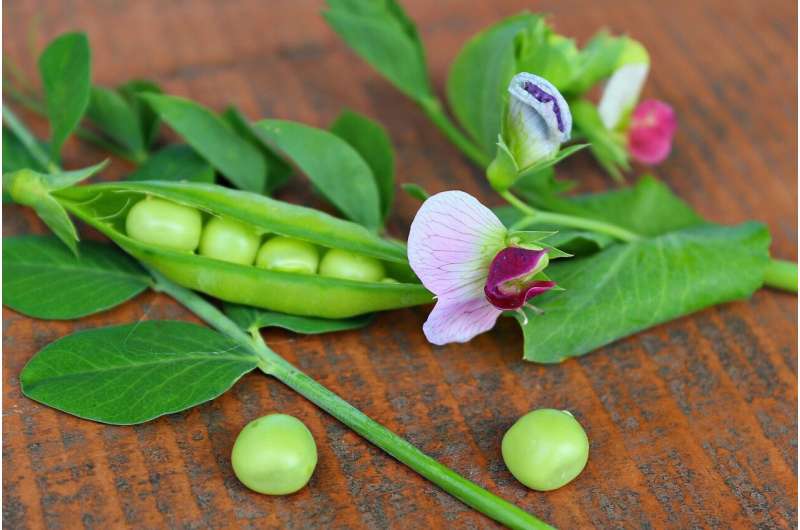
The end of the reproductive period, when flowers and fruits are produced, is a crucial moment in plants’ life cycles. However, the factors that control this process must be better understood.
A research team led by the Research Institute for Plant Molecular and Cellular Biology (IBMCP), a joint center of the Consejo Superior de Investigaciones Científicas (Spanish National Research Council; CSIC) and the Universitat Politècnica de València (UPV), has found that a gene called FUL controls the duration of the reproductive phase in crops such as peas. This gene could be used as a biotechnological tool to prolong this phase, thus increasing the production of fruits and seeds in peas and other legumes such as chickpeas, lentils, or beans.
The work has been published in the Proceedings of the National Academy of Sciences (PNAS).
Annual plants have only one reproductive season, producing flowers and fruits. Scientists are looking for genetic factors that cause plants to stop flowering to control the length of their reproductive phase. A few years ago, the group led by Cristina Ferrándiz, a CSIC research professor at the IBMCP, identified a gene called FUL (FRUITFULL) as an important regulator of the flowering stops.
“The first studies were conducted only in Arabidopsis, a laboratory plant of no agronomic interest,” Ferrándiz recalls. “We wanted to know if this function of FUL was the same in other species, especially crop species, and if we could use this knowledge to generate plants that produce flowers and fruits for longer, and therefore have a higher yield,” she summarizes.
To this end, the team led by CSIC researcher Francisco Madueño at the IBMCP, and including French and Canadian scientists, studied the role of the FUL gene in pea plants, a legume with high nutritional value.
“We have seen that mutations that lead to a loss of function of the FUL genes in peas cause the plants to produce flowers, and consequently fruits, for much longer. This tells us that FUL controls the duration of the reproductive phase not only in the laboratory plant Arabidopsis but also in other species, including crop plants,” explains Ferrándiz.
“The prolonged flower and fruit production means that in certain pea varieties, mutations in the FUL genes can double the seed production, with identical nutritional characteristics to non-mutant plants, both in the greenhouse and the field,” she says.
Mutants generated by classical methods
The research’s authors emphasize that to obtain the mutations in the FUL genes analyzed, they used mutant banks obtained by classical methods without generating transgenic plants.
As a result, “the method for obtaining new plant varieties can be based on traditional mutagenesis, as used today and in this study, or on gene editing using CRISPR, the most promising and powerful tool for precision agriculture in the near future,” says Madueño.
“The potential application of these results is to use the FRUITFULL genes as a biotechnological tool to improve the yield of leguminous crops. The most significant increase in seed yield has been observed in medium-yielding pea varieties. In contrast, in high-yielding varieties, which already have a very high yield, the effect of mutations in the FUL genes is small,” says Ferrándiz.
For the IBMCP researchers, the FRUITFULL genes could be beneficial to quickly and directly improve legume varieties. They are very valuable because they have interesting characteristics, such as high resistance to pathogens or drought, but are currently not used because of their low yields.
“Mutating the FUL genes in these varieties would most likely also make them high-yielding and useful for agriculture. This could be very important given the challenges we face in the context of the climate crisis and the need to develop varieties that can better withstand it,” the researchers say.
More information:
Irene Martínez-Fernández et al, Analysis of pea mutants reveals the conserved role of FRUITFULL controlling the end of flowering and its potential to boost yield, Proceedings of the National Academy of Sciences (2024). DOI: 10.1073/pnas.2321975121
Provided by
Universitat Politècnica de València
Citation:
Precision agriculture research identifies gene that controls production of flowers and fruits in pea plants (2024, April 10)
retrieved 11 April 2024
from https://phys.org/news/2024-04-precision-agriculture-gene-production-fruits.html
This document is subject to copyright. Apart from any fair dealing for the purpose of private study or research, no
part may be reproduced without the written permission. The content is provided for information purposes only.







